
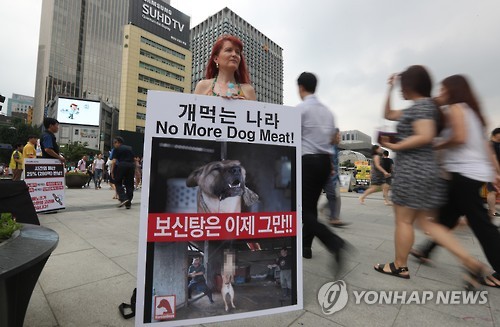
It is expected that signboards of "Boshintang" disappear in the restaurants in Gangneung and PyeongChang before 2018 Winter Olympics PyeongChang. Gangwon Province promotes the development project of signboards of the restaurants to respond to the feelings of the foreigners against "Boshintang" or "Nutritional soup" that mean dog meat dishes with Winter Olympics PyeongChang near at hand. In April, 2016, Kim Jon-doc, the minister of Ministry of Culture, Sports and Tourism requested the International Olympic Committee (IOC) to change "white tiger", the mascot of the PyeongChang Olympics to Korean Jindo dog. It failed. IOC said that Korean Jindo dog was not suitable for the mascot, because Korea had the dog meat culture. |
My Opinion
|
|
Urawa Red Diamonds pull off a sensational comeback in the second-leg of their 2017 AFC Champions League Round of 16 clash against Jeju United on Wednesday, winning 3-0 after extra time to progress to the quarter-finals 3-2 on aggregate. Just before the end of the game, a skirmish happened in a far side from both benches, and Baek Dong-kyu, a substitute of Jeju who wore bibb did a elbow strike to opponent MF Abe even if he was at the bench and was sent off a field. Furthermore, the skirmish continued after the game, and Makino (Urawa team) was run after obstinately by a Korean player. After the game, the match commissioner and the panel of judges investigated the scene of the problem thoroughly with a video. They gave Jeju players two red cards for their violent acts and insult, and two yellow cards for the act of anti-sports. They also gave two yellow cards to Urawa players. Urawa side is going to protest the AFC. Makino said "I have never seen that the player who wore bibb did an elbow strike across the court". Jo Seung-hwan, the coach of Jeju said, "some players of Urawa did a ceremony that stimulated us. The players who lost have to have the manner and the players who won have to have the manner too." He did not say apology at all. |
My Opinion
|
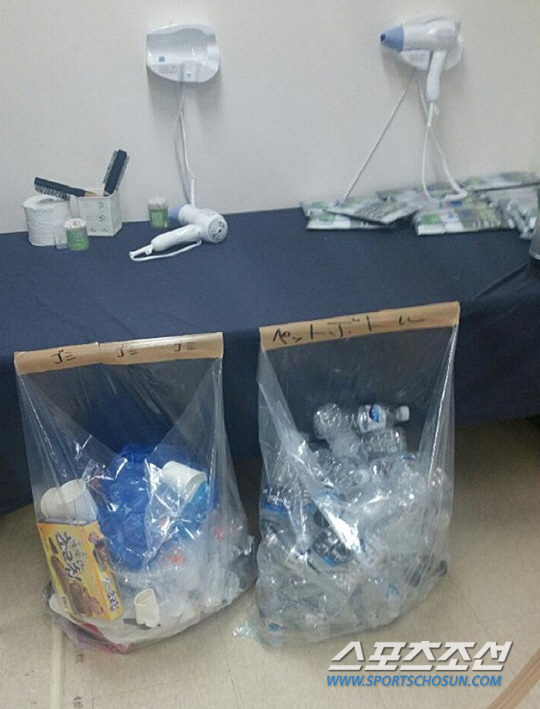
A locker room did not have one wastepaper. They collected and classified all." On the night of May 27, Italy vs Japan, a group match of FIFA U-20 World Cup Korea Republic 2017 was carried out. After the game, Kim Byung-soo, the superintendent in charge of the organizing committee Cheonan city World Cup support group was astounded at unbelievable scenery. After having finished a refreshing excellent game, the locker room of the Japanese team they left was clean incredibly. The members could not find one wastepaper, and the plastic bottles and the paper cups were classified exactly. The employees who were tired from the hard work of the game schedule repeated every three days felt the feeling of thanks to the quiet consideration of the young team. Korean net user We show our respect for Japanese. They are well-mannered, they have deep consideration and make an effort to respect neighbors, except some politicians. This is because they received such an education since they were young. They study eagerly, but do the manner education eagerly. That is the point different from Korean. |
My Opinion
|
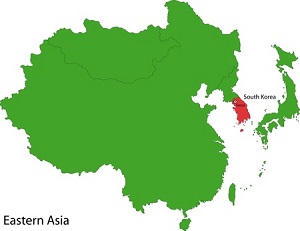
A Korean scholar said, "Japanese are recently translating 'Anti-Korea' feelings into action, because there is the historical issue between Japan and Korea. People of two countries don't trust each other and they criticize each other. In addition, it influences the feeling that Japanese economy is stagnant in the long term. The governments of two countries leave their public opinions to do as they like. Lu Hao, a member of Japan Institute in the Institute of Chinese social studies said, "Japanese contempt to Korean has the historic reason". Mr. Lu said, "After the Meiji Restoration in Japan, the Japanese modernization level led the Korean Peninsula from beginning to end. And Japan did the colonization to the Korean Peninsula. Korea was a Japanese dependency until World War II end all the time. Such a historic process leads Japanese arrogant attitude toward Korean residing in Japan, and the specific discriminatory name has the origin here." After World War II, many Koreans stayed in Japan, and lived there. It was difficult for them to adapt themselves to the Japanese society, and as they were watched on by Japanese Government and the U. S. Forces in Japan in the Korean War, they were out of the society in the long term. And as some Koreans made the illegal groups and engaged in illegal business, Japanese people had ill feeling to them. |
My Opinion
|

Korean homeless Homeless people in Korea live in the parks and the stations in big cities such as Seoul, and they generally live on begging and charity from the citizens. They talk and walk about all day and they receive charity from passerby, purchase food and liquor and eat and drink with some friends. When they get drunk, they lie on there and when they come out of drunkenness with no money, they stay absentminded there. And when they get money, they eat and drink again. Some had family and children, but abandon family life. Japanese homeless Homeless people can get income supports in Japan that has the advanced social welfare system. But they don't want to get them, even if they live poor lives. In addition, they make living mainly by day labor or buying empty cans without begging unlike Korean homeless. Decisive difference is that Koreans live their lives by begging and Japanese live their lives without relying to other persons.
A Chinese net writes, "When a Chinese was going to hand money to a Japanese homeless who guided the Chinese, he refused to receive the money and said, 'I did not guide you with such an intention' and he got displeased." |
My Opinion
|

On May 7 Korean newspaper, the Chosun Ilbo claimed, "The origin of the rice was not China, but Korea". We have various opinions about the origin of the rice, and although we do not have the clear conclusion yet, China and India are generally regarded as the main places of the origin. Korea has suddenly begun to insist, "Korea is the origin of the rice. It's not China". Chinese people are amazed at this "opinion of Korea origin on the rice". Japanese are same as Chinese and they say "Usual Korean disease began again." or "Congratulations (laugh)." They are tired with Korean disease. |
My Opinion
|

According to the survey of Allergan Korea, a multi-national pharmaceutical company, 42% of Korean women have had beauty surgical operation. 42% of 450 Korean adult women from 21 years old to 55 years old have had the experience of the beauty surgical operations such as Botox or the filler. Furthermore, 25% answered that they had not yet undergone a beauty surgical operation but they were going to undergo that. 17% answered that they wanted to think about the operation. After all 84% of all respondents had beauty surgical operation or have intention to do that in future. Only 16% do not have plans to undergo beauty surgical operation. |

This closely resembles with "Aerial" and "Sakusaku Corn". They are 4 laminar structure snacks. The corn taste version of "Kobuk Chip" resembles that of "Sakusaku Corn". A person concerned with Orion contradicted that and said, "We knew that there was a product similar to our product in Japan. The form is the same as a Japanese one, but process of manufacture is totally different." |
| My Opinion | Aerial (2009) - YAMAZAKI-BISCUITS (Japan) | Sakusaku Corn (2015) - Seven-Eleven Japan |


|


|
| |

South Korea's first female president, Park Geun-hye, is now also the nation's first impeached president. The Korean Constitutional Court on Friday voted unanimously to remove her from office, and snap elections for a new president will be held within 60 days. The subsequent media coverage is rife with comparisons between Park and Trump, claiming that the impeachment of the former augurs the same fate for the latter. Social media sentiment is similar, with tweets like "Your move, America" and "Next to go is Trump." However, likening Trump to Park demonstrates not just wishful thinking, but a fundamentally incorrect assumption that democracy is the same in every country. I have no great love for Park, but it's hard not to notice that her impeachment is pretty much based on the Korean people's hurt feelings. She is possibly the first president of any democratic nation to be formally impeached for being embarrassing, stupid and indiscreet, and not for hard evidence of graft, corruption or perjury. In America, there is no way a president can be impeached for being embarrassing and stupid. In fact, it might be one of the only jobs in the United States where you can't be fired for that sort of thing. And that's probably a good thing; ruling by the people's emotions might work in Korea, but it is not compatible with American democracy. By US legal standards, Park's impeachment is peculiar in that she was ousted before even being fully investigated. Even the special prosecutors making the case against Park reportedly claimed they didn't have time to complete the inquiry and were denied an extension. However, even if she had been clearly linked to financial malfeasance, this crime would have been secondary to the Korean public. After all, in Korea, it has historically been the case that bribery is synonymous with presidency, and some of her predecessors literally absconded with billions of Korean public funds. None of them was ever impeached, though several were prosecuted after leaving office. Make no mistake: If there were more digging, it's very possible that a dirty money trail would have led directly and indisputably to Park. But the Korean people and the courts were not interested in waiting. They weren't even that interested in the money trail. Korean democracy is very different from its American counterpart: The Korean democratic state is young; it was founded in 1948, and it has only been a truly autocrat-free democracy since 1987. That's just 30 years. To play catch-up to Western democratic principles, it could only effect change through dramatic upheavals and revolutions. |
My Opinion
|

Kang Dong Won gave his own apology about the controversy regarding his great-grandfather, who was reportedly involved in a mining project during the Japanese colonial period and listed in the pro-Japanese biographical dictionary. Below is a complete translation of Kang Dong Won’s statement. “Hello. This is Kang Dong Won. First, I would like to sincerely apologize for causing an uproar about my great-grandfather. Ever since I was little, I grew up hearing positive stories about him. My grandmother was the descendant of an independence patriot, so I accepted the stories about my great-grandfather without much thought. In 2007, at the time of the interview, I did not properly understand his wrongdoings. I apologize once again. This incident was chaotic, and it was a big shock for me. Moreover, it is related to my family, and I had to figure out the accurate details about the issue, so I needed time to look into the related documents. I apologize to the people involved for my inability to respond adequately, and I also apologize that I was not able to announce my position in a timely manner. Before I am an actor, I am a Korean citizen, and I have always thought that wrongful history had to be corrected, and that such shameful deeds should never be repeated again. For that reason, I am truly ashamed about this incident. I now know about my great-grandfather’s shameful past. Through this incident, I will study more about our history and reflect on myself. Even if it’s something small, I will search for things I can do. Once again, I apologize to anyone I made feel uncomfortable.” |
My Opinion
|
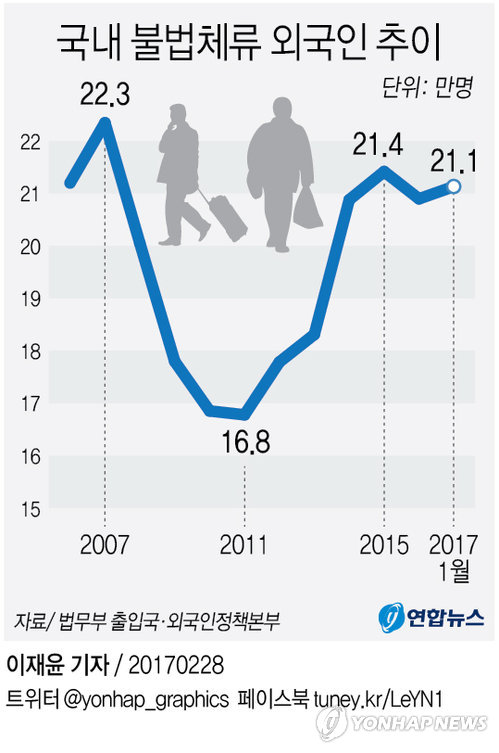
According to the Ministry of Justice of South Korea, the total number of foreigners staying illegally in Korea was 211,300 in January, 2017. The ratio of illegal foreigners to the total number of foreigners in Korea is 10.5%. As of January 2017, China topped the list with 50%, followed by Vietnam (7.4%), U. S. (6.8%), Thailand (4.7%) and the Philippines (2.7%) out of the stay foreigners in Korea. (2017/2/28 Korea・Yonhapnews) In 2014, China topped the list with 70,311, followed by Thailand (44,283), Vietnam (26,932) and the Philippines (12,814) out of the total 211,300 illegal immigrants. (2014/1/28 Korea・JoongAng Ilbo) On the other hand, according to the Ministry of Justice of Japan, the total number of foreigners staying illegally in Japan was 63,492 as of July 1, 2016. South Korea topped the list with 13,180, followed by China (8,592), Thailand (6,287), Philippines (5,218), Vietnam (4,322), Taiwan (3,607), Indonesia (2,280), Malaysia (1,776), Singapore (1,030), Brazil (968) and others (16,232). (Japan・Ministry of Justice 2016/7/1) |
My Opinion
|

Seoul lodged a protest with the Japanese government Wednesday for dispatching a parliamentary cabinet vice minister to an annual event promoting Tokyo's claims over "Dokdo", Korea's easternmost islets, for the fifth consecutive year. The Japanese government earlier that day sent Shunsuke Mutai, a parliamentary vice minister of the cabinet office, to Shimane Prefecture's "Takeshima Day" ceremony. Japan refers to the "Dokdo" islets in "the Sea of Japan" as "Takeshima". Shimane Prefecture designated Feb. 22 as "Takeshima Day" in March 2005, a century after declaring it as Japanese territory. It has held the celebration annually. Civic activists nationwide also protested the "Takeshima Day" event in Japan and held rallies proclaiming Korea's sovereignty over "Dokdo". They protested Japan in front of Japanese Embassy in Seoul and shouted "Stop the unfair territory claim !". |
My Opinion
|

Lacky who appeared for a popular variety show of JTBC TV said his rocky history before adapting himself to life in Korea. The trouble began since room-finding in Seoul just after a visit to Korea in 1996. He borrowed a rooming house for 700,000 won a month (approximately 700 dollars) near the university and started his life, but it was 150,000 won (approximately 150 dollars) when he asked his Korean friend who lived in the similar room later. He appealed to the owner of the house and said "That was a fraud", but the owner said, "You said 'OK' for 700,000 won". In the 2000s, Lacky started activity with TV and lent the money to his manager. He handed 4 million won (approximately 3,930 dollars) as operation costs of the manager's mother. After a time Lacky asked his manager to pay money. The manager got angry at that. ---------------------------------------------------------------------------------- Lacky's experience is not special but is common in Korea. Taxi does not go straight to the destination and stops at many other places. Many international tourists say the dissatisfactions for unkindness and the overcharging rate in Korea. Yuko Fueki (known as Yoo Min in Korea) who played as an actress in Korea said, "My manager who worked together had the financial illegal act. I worked in a salary system, but he did not send the money I earned in Korea to my office in Japan. I worked for salary 100,000 yen." (Korea・tvN) Koreans often open the refrigerator of their friends without permission and drink juice. It's common. Lacky's manager thought the money he borrowed was his money. |

Li Chil-yong, the president at the association of Korean industrial artists wrote, "Korea taught Japan 'Raden lacquerware' in his book called 'Li Chil-yong's diary of the industrial arts". According to the book,
"'Fujiyama (富士山) Encyclopedia' in Japan wrote, 'Korean Raden lacquerware craftsman Jon Song-gyu went to Japan with Song Ju-an and Kim Bong-ryong, and taught Japanese the technique of Raden.
As Japanese met a Korean first-class engineer, the Korean Raden lacquerware clearly influenced that of Takaoka city.'
He mistakes "Toyama (富山) Encyclopedia" for "Fujiyama (富士山) Encyclopedia". ------------------------------------------------------------------------------------------------------- Takaoka lacquerware cooperative describes that as follows. "The mainstream of the current Takaoka lacquerware is 'Aogai-nuri' and it is greatly influenced by 'Somata-zaiku' made in Toyama feudal domain in early Meiji period (1868-1912). On the other hand, early in the Taisho era (1912-1926), when Japanese craftsman Kimura Tenko worked at 'Governor-General of Korea central industry laboratory', he deepened his friendship with Korean craftmen of 'Korean works' and he came back to Japan with Korean craftmen. Korean craftmen came back to Korea afterwards. So it is supposed that Takaoka and the Korean technique affected each other. The Takaoka lacquerware strongly receives the influence of 'Somada-zaiku' handed down in old times than this 'Korea works'. 'Somada-zaiku' and the 'Korea works' have different technique, but both affected Raden of Takaoka lacquerware and have been inherited. Takaoka lacquerware have developed through the effort of the design and the technical development by craftsmen in the long history. In addition, about 'Toyama encyclopedia' published by Kitanihon Press, I confirmed items about the Takaoka lacquerware, but was not able to confirm the contents the Korean says." This is considerably different from the article of Korean newspaper. |
|
My Opinion
This is the usual pattern that the forgery Korea is good at is carried out.
|

The Daejeon District Court in central South Korea on Thursday approved a request by Buseoksa temple to take delivery of an ancient Buddhist statue stolen from a Japanese temple in 2012. Buseoksa temple, in Seosan, central South Korea, has claimed rightful ownership of the statue of the Avalokitesvara Bodhisattva, saying it was made there in the 14th century. It is one of two statues that were stolen from a temple and a shrine on Tsushima island in Nagasaki Prefecture, Japan in October 2012. Calling the ruling "highly regrettable," the Japanese government's top spokesman said Thursday Japan will keep appealing to the South Korean government to act "appropriately" so the statue can be returned. In February 2013, the court approved an injunction request by Buseoksa temple suspending the return of the statue until it was confirmed that the religious artifact was legitimately brought to Japan, and not plundered by Japan. Three years after an injunction was implemented, the temple filed a suit requesting delivery of the statue. |
My Opinion
|

A local court acquitted Park Yu-ha, a professor at Sejong University, Wednesday, of defamation charges for referring to some "comfort women" as prostitutes in her book "Comfort Women of the Empire." Academic freedom is a basic right guaranteed by the Constitution, the court said. Ms. Park was indicted in November 2015 on charges of defaming "comfort women" for the Japanese military before and during World War II, by referring to them as "prostitutes" who were "in companionship with Japanese soldiers." She also stated that the Japanese government did not force the women into sexual slavery, in her book published in 2013. There can be criticism and refutation against the opinion the defendant presented in the book and the opinion can be taken advantage of by those who support this view, but this is a matter of a value judgment and therefore the court is not able to exercise authority nor has the ability to in the procedure of a criminal case, the court said. It added: "Judgment on the defendant's view must take place in an academic setting, through discussions." The prosecution had sought a three-year prison sentence for Ms. Park, stating, "The defendant with definite intention distorted history without any evidence, and therefore exerted harm on the social evaluation of individual sex slave victims." Following the court's ruling, Ms. Park said "It was hard to fight by myself, but I am grateful that the judges delivered a righteous ruling." A year ago, Ms. Park lost a civil lawsuit. After she was indicted in November 2015, a local court ruled that she must compensate nine victims with 10 million won each. Ms. Park appealed and the case is pending at a higher court. |
My Opinion
|

South Korean prosecutors have arrested the culture minister on Saturday for suspected involvement in drawing up a blacklist of artists, writers and entertainers critical of President Park Geun-hye. The court also ordered an arrest warrant for Kim Ki-choon, a powerful former chief of staff for Park. Kim is accused of ordering Cho to create the list of "left-leaning" artists. It is unbelievable, but there seems to be the law that you can be arrested just to have made a list in Korea. The Japanese reporter who reprinted the article that criticized the Korean President was put to trial last year. Korean law is funny. It can be never said that Korea is a constitutional state. Japanese Ministry of Foreign Affairs changed the description about Korea on the website. It had been "Japan and the Republic of Korea (ROK) are most important neighbors to each other which share the basic value such as freedom, democracy, the market economy, etc.." But it changed to "Japan and the Republic of Korea (ROK) are most important neighbors to each other." This means "Korea is not a country of freedom and democracy. So Japan does not share basic value with Korea." According to the statistics of South Korean National Police Agency, "the number of persons who are prosecuted for false testimony, fraud and false accusation is 165 times more than Japan." (Korea・Chosun Ilbo) In other words, "Laws are incoherent" and "There are many bad people". |

On January 18, 2017, it is thrown into an uproar that the presiding judge sentenced the defendant to one year penal servitude at a criminal trial in Korea but he corrected the sentence immediately and sentenced him to three years penal servitude. The first trial judgment for a man (52) prosecuted on the charge of false accusation and forgery of private documents has caused controversy. In September, 2016, the presiding judge sentenced the man to penal servitude twice in a district court. The first sentence was one year penal servitude same as the prosecution but the second was three years penal servitude. "Three years penal servitude" was written down in the decision. After the defendant was sentenced to one year penal servitude and he expressed dissatisfaction to the presiding judge and said "it was a trial of the nonsense", the presiding judge called back the defendant who left the court and the judge gave him the heavy sentence. The presiding judge explained, "because the defendant shouted curses in the middle of announcing the sentence, and made noise, I corrected the sentence. I can change the sentence orally before finishing the announcing the sentence." |
My Opinion
|

Prosecutors on Monday requested the arrest of the de facto head of Samsung Electronics, the country's most valuable company, in an influence-peddling scandal that has toppled the country's president. Lee Jae-yong, the 48-year-old vice chairman at Samsung Electronics, faces allegations of embezzlement, of lying under oath during a parliamentary hearing and of offering a bribe of 43 billion won ($36 million) to a long-time friend of impeached President Park Geun-hye, according to Lee Kyu-chul, a spokesman for a special prosecutors' team investigating the political scandal. A Seoul court said it will review the prosecutors' request on Wednesday. The request takes two to three days to review, according to a Seoul court official in charge of arrest warrants who declined to give his name because of office rules. |
My Opinion
|
|
My Opinion
|

The order of countries according to the crime types that the World Health Organization (WHO) announced in 2013 gave a shock in Korea. In a fraud crime, Korea pushed second place Mexico and third place South Africa aside, and Korea got the first place. In other words Korea is "world's worst fraud country"(Korea・Cho Gab-je.com). According to statistics document "2016 crime analysis" of the Korean Public Prosecutor's Office, the number of fraud crimes is 203,346 in 2006, 224,889 in 2009 , 239,720 in 2012 and 257,620 in 2015. It increases steadily. According to "the crime statistics document 2015" of the Japanese National Police Agency, "number of the fraud in Japan is 39,432. In other words the number of the fraud in Korea is 6.5 times bigger than Japan. It becomes more than 10 times by the population ratio.(Korea・Cho Gab-je.com) |
My Opinion
|
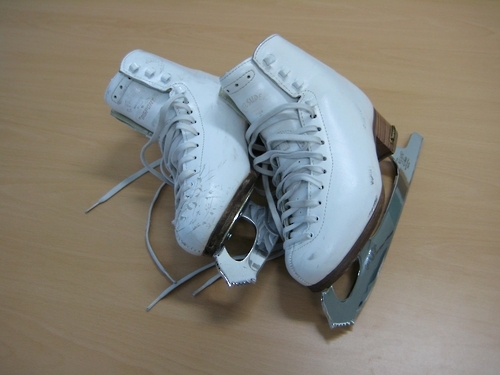
The pair of ice skates that figure skating champion Kim Yu-na wore during the 2010 Vancouver Winter Olympics to win the gold medal will be designated as a cultural asset. The Cultural Heritage Administration (CHA) announced that it will include objects and buildings that are less than 50 years old to be registered as cultural assets in its plan for 2017. |
My Opinion
|
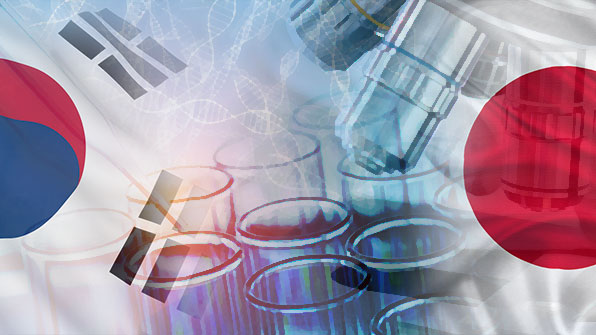
The Korean small and medium‐sized enterprises judged by themselves that their core technique standards are more than one and a half years behind United States, Japan and Germany. According to "2016 small and medium‐sized enterprises technology statistics working papers (2015 standard)" that the Small and Medium Enterprise Agency and small and medium‐sized enterprises central society published jointly, Korean small and medium‐sized enterprises judged the average levels of the eight main techniques that they had were inferior to the main developed countries. Eight main techniques are machine material, electricity and electron, information and communication, chemistry, bio and medical care, energy and resources, knowledge service and ceramic. They judged that the technological gap between Korea and the United States was 1.8 years. 1.6 years for Japan and 1.5 years for Germany. But they judged Korea was 3.1 years ahead of China. On the other hand, the ratio that they answered their possession technology was "ahead" of the United States was 8.0%. The answer saying that they were a little ahead of Japan was 7.5% and 8.5% for Germany. The answer saying that they were ahead of China was 86.8%. |
My Opinion
|

A sign of the billiards boom revival is seen recently in Korea. However, there are unpleasant words in terms of the broadcast. They are "Sugu (手球)" and "Chokku (的球) ". They are from Japanese words. Sugu (手球) means "my ball". "手球" is Japanese Kanji word (You can read "手球" as "Tedama" or "Syu-Kyu" in Japanese. "Syu" is "Su" in Korean and "Kyu" is "gu".) In other words, we just accept even the Japanese billiards terms and use them in Korea. "的球" is same. It means "first object ball". Japanese call this "第1目的球" or "的球 (Matodama)" in short. ("的" is called "Teki" or "Mato" and "球" is "Kyu" or "Tama" in Japanese. Japanese "Teki-Kyu" turns into Korean "Chok-ku") You can express each of these in pure Korean word. At first you can call "Sugu" with "Ne kong" (my ball). "Chokku" is "Ap Kong" (first ball). |
My Opinion
|
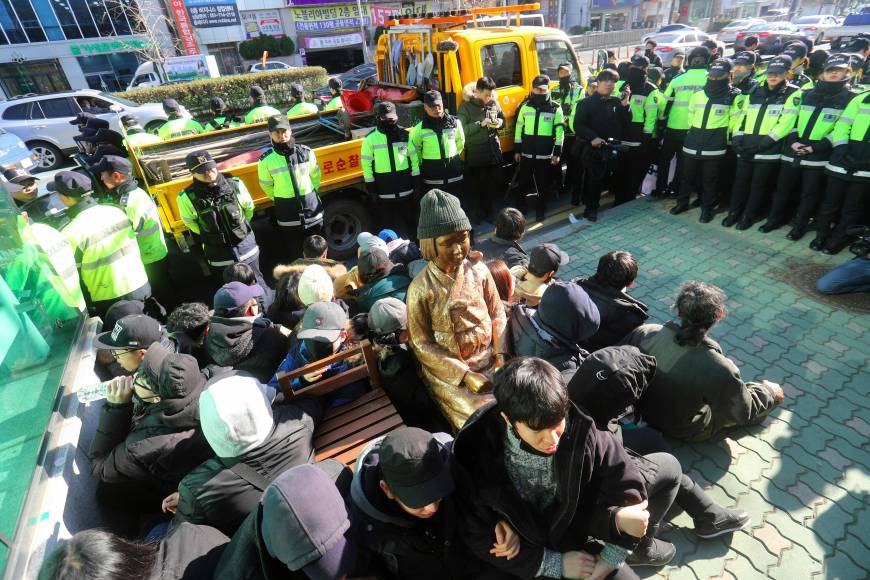
This picture taken on Dec. 28, 2016, shows South Korean activists staging a sit-in protest around a statue in Busan of a teenage girl symbolizing former 'comfort women' who served as sex slaves for Japanese soldiers during World War II. Japan’s Chief Cabinet Secretary Yoshihide Suga told a news conference that the statue was “extremely regrettable” and that Japan was temporarily recalling its ambassador in Seoul, Yasumasa Nagamine, and the consul-general in Busan. He also said Japan would also postpone bilateral “high-level” economic dialogue and that Japan was suspending talks on a new currency swap arrangement with South Korea. Korean Minister said, "I am very disappointed", but a tendency of perplexity is obvious inside the Korean government. According to Suga, the installation of the Busan statue “adversely affects” bilateral relations and violates the article 22 of the Vienna Convention on Consular Relations, which obliges a host country to protect the “dignity” of a consulate. About Vienna Convention, Korean government does not have the logic to persuade Japan.
Japan said on Friday it was recalling its ambassador to South Korea over a statue commemorating Korean women forced to work in Japanese military brothels during World War Two and that the statue violated an agreement to resolve the issue. The two nations agreed in 2015 that the issue of “comfort women”, which has long plagued ties between the two Asian neighbours, would be “finally and irreversibly resolved” if all conditions of the accord - which included a Japanese apology and a fund to help the victims - were met. Under the agreement, the South Korean government promised to “strive” to resolve the diplomatic row over the comfort woman statue in front of the Japanese Embassy in Seoul “in an appropriate manner.” But the statue has remained in place for more than a year, and Seoul didn’t stop a citizens’ group from erecting the new one in Busan on Dec. 31. |
My Opinion
|
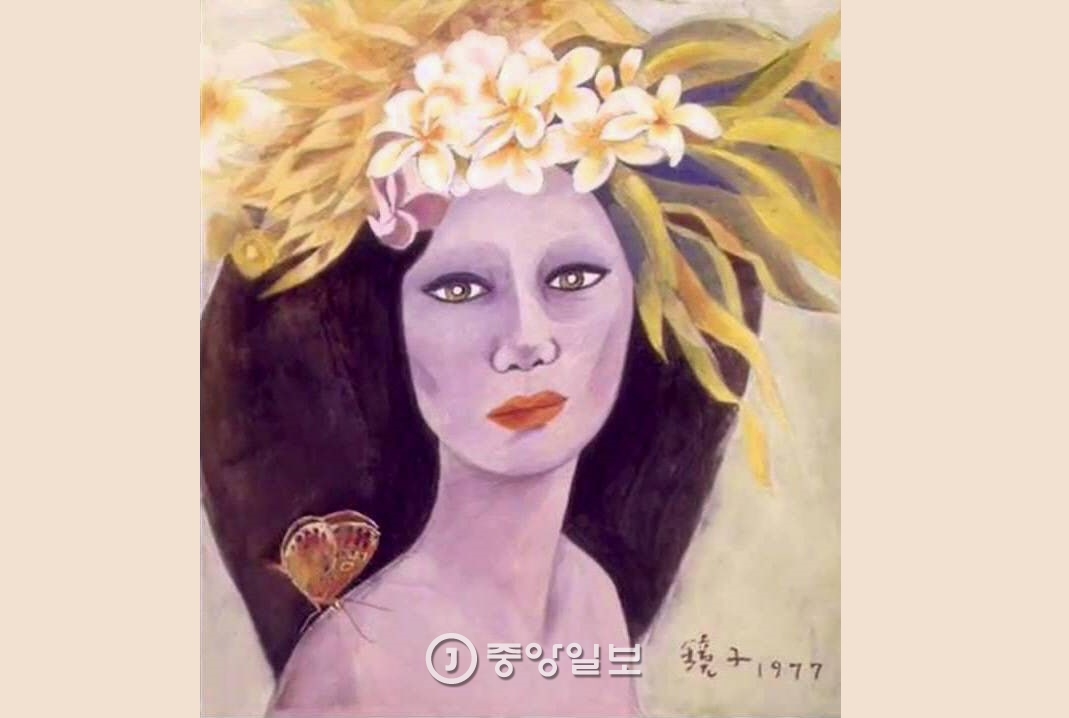
Lumiere Technology in France gave a press conference in Paris again and refuted Korean prosecution that had announced the picture of 'Beautiful Woman' by Korean paintress Chun Kyung-Ja was genuine. On January 5 Jean Penicaut, CEO of the company said through the press conference, "Korean prosecution distorted statistics. If you followed the way of the prosecution, the probability that the picture is genuine will be only 0.0000000006%". Prior to this, Korean prosecution had said, "We applied the calculating formula that Lumiere Technology had used for 'Beautiful Woman' for other genuine works and the probability level to be genuine was 4% as a result." Penicaut said, "Korean prosecution distorted our proof. It is an intentional error to apply this for other statistics comparisons. That's a complete forgery". "'Probability 4% for genuine picture' means 'probability 0.0000000006% of counterfeit for 'Beautiful Woman'." |
My Opinion
|
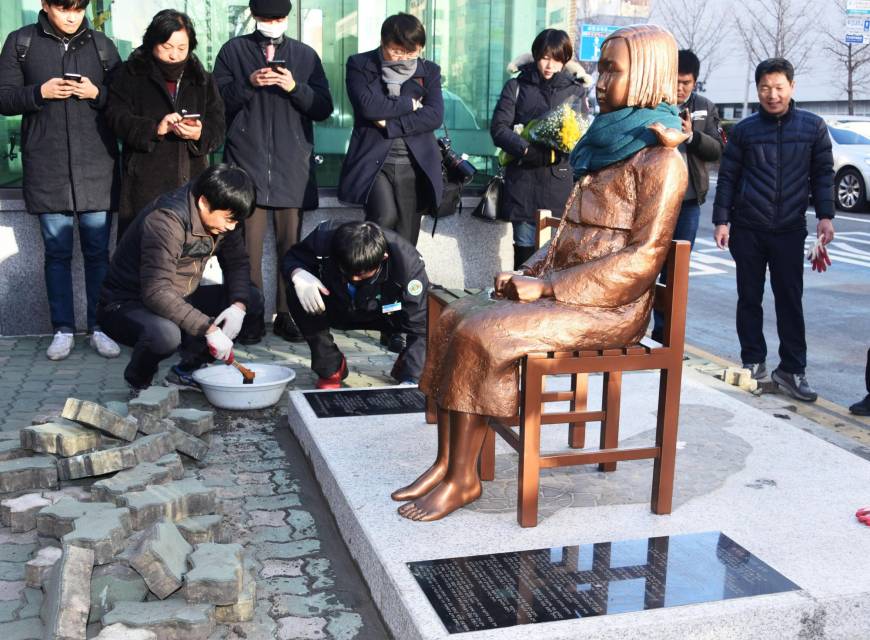
A civic group on Friday installed a statue symbolizing women forced to work in Japanese wartime military brothels in front of the Japanese Consulate in Busan, a move that could strain Japan-South Korea relations. The Japanese government has requested the removal of the statue installed in front of the Seoul embassy, claiming that it breaches the Vienna Convention on Diplomatic Relations, an international treaty that outlines a framework for diplomacy. Under the deal between Japan and South Korea reached in December last year, the two countries agreed to resolve the issue “finally and irreversibly.” South Korea set up a foundation into which Japan has deposited \1 billion to care for the surviving victims and their families. Neither government mentioned the removal of the statue as a condition for Tokyo’s financial contribution, but South Korea said that it “will strive to solve this issue in an appropriate manner.” |
My Opinion
|

French art experts on Tuesday lambasted South Korean state prosecutors for declaring a "fake" painting to be genuine despite its own scientific findings that supported the artist's disavowal of the work. The painting "Beautiful Woman" by one of South Korea's most renowned artists, Chun Kyung-Ja, has been the focus of a bizarre and decades-long dispute over its authenticity. Before her death last year at the age of 91, Chun had repeatedly insisted that the 1971 portrait owned by the country's National Museum of Modern and Contemporary Art (MMCA) was not one of hers. Parents can recognise their children. That is not my painting, she insisted. The museum is adamant that it is genuine, and in April a prosecutorial investigation was launched after one of Chun's daughters filed a complaint. She accused former and current MMCA officials of hurting the artist's reputation by promoting the painting as authentic. State prosecutors last week found in favour of the museum, citing forensic evidence and the opinion of local art experts. They also clarified the provenance of the painting, saying it was once owned by the former head of the South Korean spy agency and was appropriated by the government after he was executed for assassinating then-president Park Chung-Hee in 1979. This announcement is an egregious affront to the justice system, French imagery analysis firm Lumiere Technology and Chun's relatives said in a joint statement. The statement accused the prosecution of continuing to "willfully avoid seeking the truth even when presented with it". Chun, born in 1924 in a small town in the southern part of the Korean peninsula, was best known for her paintings of female figures and flowers using vivid primary colours that broke with traditional South Korean styles. Her works have recently sold at auction for between $700,000 and $1 million. Lumiere Technology said it published a 63-page report after a "thorough" and scientific examination of the piece and nine authenticated paintings by Chun. Based on forensic analysis using specialist technology, Lumiere Technology concluded that "the 'Beautiful Woman' is "absolutely and unequivocally a forgery". But the prosecution authorities "completely disregarded" Lumiere Technology's scientific results, arriving at a conclusion based on "statements and notions backed by no evidence", it said. The Prosecution's denial of empirical evidence is akin to a DNA paternity test - for a child revealing that a man is in fact not his father - being disregarded in place of the mother's testimony that the child must be the offspring of that man because she never had a relationship with another man, it added. |
My Opinion
|

There may be political pressure for the state to maintain the painting's authenticity. A court in South Korea has declared a contested painting by artist Chun Kyung-Ja to be genuine, AFP reports, contradicting both forensic evidence and statements from the late artist, which both claim the work is a fake. The work Beautiful Woman, bearing the date of 1977, is currently in the collection of the National Museum of Modern and Contemporary Art (MMCA). But the story of how it got there is a violent and cinematic one. According to the report released by prosecutors on Monday, December 19, the painting was previously owned by Kim Jae-gyu, who served as director of the Korean Central Intelligence Agency from 1976. His post ended in 1979, after he assassinated President Park Chung-Lee at a dinner in a KCIA safehouse. After Kim’s execution by hanging in 1980, the painting fell into the hands of the government. A number of antiquities and artworks that were once owned by Kim, however, have turned out to be fakes, alleges the defense in a statement. Chun’s family also claims to have forensics on their side: at their request, French company Lumiere Technology undertook an analysis of Beautiful Woman, and found the possibility that it was painted by Chun to be 0.0002 percent. The prosecution reportedly completely ignored that number. But above all, the artist herself once asserted, “Parents can recognize their children. That is not my painting.” A statement from the family’s lawyer reads, “The prosecutors conspired with the MMCA to ignore the scientific opinion of a world-class imagery assessment firm and…produced this ridiculous result.” “We wonder if the prosecutors…caved in to political pressure,” it continued. Beautiful Woman has been the subject of conflict for years already, beginning with the artist’s disavowal of the painting in the 1990s. She left South Korea for the United States due to the country’s refusal to acknowledge her claim. After her death in 2015, the Korea Herald reported, one of Chun’s four children and her son-in-law threatened the MMCA with legal action if they would not acknowledge the painting as fake, claiming the museum was defaming the artist’s legacy and violating human rights. The Korea Times calls the Chun case “the largest forgery scandal in Korean art history.” It is a foil scenario to the simultaneous, ongoing Lee Ufan controversy, which saw the South Korean artist authenticating 13 works that investigators claimed to be forgeries. |
My Opinion
|

Instant noodle consumption per person in Korean is the number one in the world. The first instant Ramen in Korea was released in 1963 five years later after the Japanese chicken Ramen came up. They are "Samyang Ramen" made in Samyang foods, keeping still deep-rooted popularity. In the Home Page of Samyang foods, the process that the president Chun Zhu-Jun developed instant Ramen is written down in this way. "When Samyang Ramen came up for the first time in 1963, there were many people who still suffered from hunger in Korea. President Chun made up his mind to have to solve the hunger of the people." In the early 60s Korea was one of the poorest countries in the world. "President Chun remembered that he had eaten instant Ramen when he had visited Japan once. He thought it's the only way that could solve the food problem. He persuaded the government, and he borrowed 50,000 dollars somehow, and he introduced a machine and a technique from Myojo Foods in Japan, and instant Ramen was released for the first time in Korea on September 15, 1963." About this, details are written down in the history of the company of Myojo Foods published in 1986 as recollection of President Chun. The president Sumito Okui spoke in this way. "Mr. Chun, I will cooperate overall. The engineering fees are all-free. Your country received a great disaster by the Korean War and was hurt. Japan gained by emergency demands, and Myojo Foods did not receive the benefits directly, but we are not unrelated. Not to mention engineering fees, the royalty is not necessary, either. 10 million yen is enough for the delivery price of all the facilities." The money Mr. Chun had was 50, 000 dollars, but the price of facilities was slightly less than 10 million yen. That was 26, 800 dollars. According to the recollection, Mr. Chun received the 10-day training in the factory and he received a combination list (recipe) of the raw materials which are important for instant Ramen production in Haneda Airport. Hiroshige Hayasi (76) who is a professor at the former Doshisha University graduate school and had a talk with Mr. Chun for three times talked about him. "He was the person who had human charm. He had the strong mind for the country and he thought to save the starvation of Korean people. I think Okui of Myojo Foods was impressed by his enthusiasm and told him the combination list of the soup that was the biggest trade secrets. Mr. Chun was the great person who made the Korean "national staple", instant Ramen." In Dotombori in Osaka, Japan where you can see many Korean tourists, they say "We don't know such a history". |
My Opinion
|
Problem about Kashima's advance to the finals as the host country
|
My Opinion
|


On December 10, the Fukushima Prefectural Police arrested a Korean Jeong Seung-Ho (35) who had no fixed address and no occupation on the suspicion of destruction of property such as the stone statues. Similar damages occurred successively in Shinto shrines and the temples in Fukushima prefecture, and the police is investigating the connection. The reason of the arrest is the destruction of two stone statues of fox in Inari Shrine of the prefecture in the night on November 9. Furthermore, the suspicion that he invaded the front shrine and the main shrine, and destroyed the wooden statue of fox, etc.. According to the police, when a staff member of the police station was investigating a series of damage, he found the suspect Jeong who was walking National highway No.4 in Shirakawa-city alone at about the midday of December 10 and questioned Jeong. Jeong admitted to the charge and said "I broke the foxies". He had his passport, and it is considered to have entered Japan in November. The stone statues of Shinto shrines and the temples are broken in Fukushima, Koriyama, Sukagawa city, etc. in the prefecture. The damages are confirmed in higher than ten places in total, and the broken stone statues are approximately 100 bodies. |
My Opinion
|

An Asiana flight preparing to depart Incheon for New York City yesterday (Dec 2nd) departed over an hour late after two copilots aboard the plane had a fistfight in the cockpit. According to airport officials, two copilots (named Kim and Park) had an altercation at their crew positions as the plane was preparing to depart. Paramedics at the scene stated that copilot Kim was expected to be hospitalized after sustaining a wound in the altercation. The two pilots both started their flying careers as military helicopter pilots. As of yet, the reason for their pre-flight fight has not been released. The matter of these two men (who are responsible for the safety of their passengers) fighting within the airplane is serious. However, more serious is the fact that Asiana Airlines forced copilot Park to complete his flight duties as scheduled and without concern for his mental state after he was subjected to the brawl. |
My Opinion
|
My Opinion
|
|
South Korea's embattled President Park Geun-hye on Tuesday asked parliament to come up with a way for her to relinquish power, including when she should step down from the presidency. I will leave to parliament everything about my future including shortening of my term, she said in a televised speech amid mounting calls for her to resign over an influence scandal that has engulfed her presidency. |
My Opinion
|

Ten years ago, one police officer was called the prosecution more than ten years ago. Because he was suspected to received money in stead of overlooking an offensive case. At first, he or she rejected flatly. "I was off duty on that day. A my junior worked on that day, and I didn't think that the friend did such a thing. Investigation was done, and it became clear that he or she was doubtlessly off the duty, but worked on that day. When he or she came to the public prosecution again, his or her attitude totally changed. Just after opening the door of a prosecutor room, he or she went down on the knees. "Public prosecutor, I'm terribly sorry!" There is no change in scenery of a lie in an interrogation room of the prosecution between in the past and in nowadays. It is said that a suspect changed testimony seven times in the same stage. Some days ago, the article with the title of "South Korea is a country where persons tell lies like breathing" was placed in a Japanese magazine. Though it is an unpleasant article, it is impossible to refute -- citing a statistics of South Korean Police National Police Agency, and concluded that "the number of persons who are prosecuted for false testimony, fraud and false accusation is 165 times more than Japan." The case of intervention into the government by Choi Soon-sil, a close friend of President Park Geun-hye, persons concerned are developing a parade of lies regardless of the social positions. It was revealed that suspect Choi received money for mediating delivery of goods to Hyundai Motor company by a firm, being managed by a father of a classmate of her daughter during the elementary school days. In spite of it, suspect Choi feigned ignorance, saying "I don't know the company itself." In her apology to the nationals, President Park Geun-hye talked about suspect Choi that she was advised about "speeches and public relations." But materials regarding personnel affairs of senior governmental officials and state meetings (equivalent to cabinet meetings) were included in document being sent to suspect Choi. She said that after the Blue House was completely provided support system, she halted to send documents to suspect Choi. However, indeed, it became clear that she continued to send it to hear until April in this year. Ahn Jong-beom, President Park's former senior secretary for policy coordination, and Lee Seung-cheol, vice chairman of the Federation of Korean Industries (FKI), who had their hand in forced donations to the Mir and K-Sports foundations, said that "the money was voluntarily donated by large companies." However, when they came to the prosecutor, they started to argue "I did it by a direction by the President" and "former senior secretary Ahn ordered to do that" respectively. A proverb says that "in order to prevent a lie to come out, more 20 lies are necessary." Some interpret that the reason why there are so much lies in South Korea is that benefit of lying is larger than debt of coming out of a lie. In South Korea, though a lie being made in a court is punished for perjury, it is tolerable to tell a lie at an investigation agency from the viewpoint of rights of defense. In the U.S, it is punishable that a witness and suspect tell a lie at an investigation agency in order to assert innocence. It means that the right of silence is secured, you should tell truth once you open your mouth. During the Chosun dynasty period, "Hendrick Hamel," a Dutch sailer man, wrote that "Koreans are prone to tell lies" in his book of "Note by prisoner in Korea" (correct name in English is unknown). It is possible to be exaggeration. However, as I'm watching the Choi Soon-sil case, it is also true that I feel ashamed that South Koreans may have "DHA of lie" indeed. If Dosan Ahn Chang-ho, who taught honesty changed the country so that not to tell lies, watches it, he might knock on the earth and grieve. |
My Opinion
|
My Opinion
|

China will block South Korean movies, dramas and variety shows following an order passed by the authorities, Chinese media reported. The Chinese national media watchdog has told television stations in the Guangdong province that approvals will not be granted for programmes featuring South Korean stars. But dramas that have already been approved will continue to be aired. They told us to postpone any plans for new programmes that involve South Korean stars or copyright for South Korean TV shows, a source told South China Morning Post. "They said we would not get approval, even if we made such plans," the source added. According to the source, the ban order was passed verbally by the officials from the State Administration of Press, Publication, Radio, Film and Television. Recently, several K-pop stars were reportedly blurred or edited out on Chinese variety shows and a few Korean talents were also removed from Chinese television drama productions. Fan events and concerts which were scheduled to be held in China were also canceled. Another source revealed that it was "almost impossible" to get approval for content from the Chinese regulators. "We haven't seen any written bans from the administration, but people in the industry are quite worried and many have said they would avoid taking on any work that involves South Korean dramas recently," she said. Meanwhile, South Korean media interpreted the crackdown as a fallout of Seoul's decision to deploy the Terminal High Altitude Area Defense system (THAAD), which is supplied by the United States. The ban is viewed as retaliation against Korea's decision to deploy the Terminal High Altitude Area Defense (THAAD) system, Korea Times said. The sophisticated system, built by Lockheed Martin Corp along with the associated AN/TPY-2 tracking radar built by Raytheon, can fire anti-ballistic missiles targeting objects inside or outside the Earth's atmosphere. The US and South Korea say Thaad will reinforce the country's security against in the event of an attack by North Korea. But China is wary of the missile shield's highly advanced radar and surveillance capabilities. The Pentagon said earlier this month it will deploy the THAAD missile defense system in South Korea as quickly as possible, a move that will further deteriorate relations with China. China had strongly opposed the deployment of THAAD as the high-tech system could affect its growing power in the Eastern Pacific. This ban on Korean entertainment would surely have a major impact on TV drama productions and hugely affect the financial interests of the Korean companies. |
My Opinion
|

When Kim Young-sam became South Korea’s first democratically elected civilian president in 1993, he vowed to cure the country of the “Korean disease,” the political corruption that had become endemic. Corruption, bribery, embezzlement and the abuse of power have been modulated over the past generation but remain indisputable components of official South Korea, as the scandal now engulfing President Park Geun-hye shows. The woman, Choi Soon-sil, is accused of receiving classified information and of using her ties to Park to raise up to $70 million from big business groups for two foundations ? most of which she is said to have siphoned off ? and to get her daughter into a prestigious university. The scandal has highlighted just how prevalent “the Korean disease” remains. It encompasses the presidential Blue House, with some of Park’s aides suspected of helping Choi raise money, and big business, with Samsung alone said to have given $20 million directly to Choi or to her foundations. Senior officials from big conglomerates including Samsung, Hyundai Motors and LG have been called in for questioning. This adds to the woes at Samsung, already reeling from the withdrawal of one its flagship products, the Galaxy Note 7 phone. It also involves the powerful prosecutors office, which is accused of being too political. A prominent former prosecutor who served as a senior presidential secretary to Park is now under investigation on suspicion of helping Choi and tipping off big businesses to pending raids. And hard-charging prosecutors often end up working in the Blue House or at the big conglomerates, further cementing personal links between institutions. The kind of corruption seen in South Korea is partly the result of government-sponsored industrialization. It was Park’s father, -authoritarian president Park Chung-hee, who supported the creation of corporate giants such as Samsung and Hyundai, encouraging links between government and business in the 1960s and 1970s that remain strong today. “This is a very communitarian society, and there’s an expectation that you’re going to go with the flow,” said Scott Snyder, a Korea specialist at the Council on Foreign Relations. But in South Korea, creating this kind of distance is contrary to the bond of friendship. The concept of “butak” ? literally “favor,” but with a deep sense of obligation and expectation attached ? means that it is hard to say no when a friend asks you for something. This concept makes it difficult to create checks and balances that can overcome personal networks, Snyder said. Stephan Haggard, professor of Korea-Pacific studies at the University of California at San Diego, said the scandal is bigger than Watergate. “It’s the scope of the violations that are in play,” he said. “There’s the classified information, the foundations, the university. There are half a dozen discrete things that are likely to be illegal.” |
My Opinion
|

The three opposition parties decided Tuesday to jointly submit a motion to demand the dismissal of Defense Minister Han Min-koo to protest the preliminary signing of the military intelligence-sharing pact with Japan. The Korean Ministry of National Defense tentatively signed the bilateral General Security of Military Information Agreement (GSOMIA) in Tokyo on Monday, despite domestic political protest on the issue. Park Wan-joo, deputy floor leader of the main opposition Minjoo Party of Korea, Kim Kwang-young, deputy floor leader of the People’s Party and Kim Jong-dae, a floor spokesman of the Justice Party, held a meeting at the National Assembly in western Seoul on Tuesday. “The three opposition parties decided today to jointly submit a motion to dismiss Minister Han Min-koo over the preliminary signing of the GSOMIA,” People’s Party’s Rep. Kim said after the meeting. The two countries were close to sealing a deal in 2012, which fell apart at the last minute because of a domestic outcry over the secretive nature of the closed-door negotiations and ongoing bilateral mistrust over unresolved historical and territorial disputes with Japan. Despite Korea’s continued qualms about directly sharing information with Japan, Seoul and Tokyo have been in a trilateral information-sharing arrangement with Washington as an intermediary since December 2014. The ruling Saenuri Party responded to the opposition party’s outcry over the bilateral intelligence sharing pact, saying that Korea has a lot to gain from the agreement. The Defense Ministry has emphasized that information-sharing with Tokyo will be helpful to counter North Korea’s nuclear and missile threat amid continued provocations. Saenuri former chairman Kim Moo-sung said, “The opposition parties’ position is dumbfounding since they cannot differentiate whether it is for Japan’s benefit or for our benefit, when Japan will be sharing its strong military intelligence.” He continued, “Our country shares intel with 32 countries around the world. We’ve already made a proposal to China, as well.” Kim Myung-yeon, the Saenuri Party’s floor spokesman, said, “If we seal the Korea-Japan GSOMIA deal, there is more to gain than for us to give.” The Defense Ministry claims directly sharing military intelligence on Pyongyang will help deter its nuclear and missile threats. |
My Opinion
|